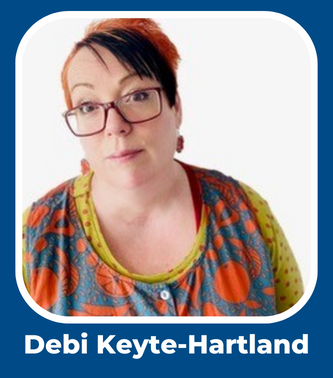
Debi Keyte-Hartland is an experienced consultant, trainer, presenter, and workshop leader with over 25 years experience in professional learning and development of early childhood educators/settings across the UK and internationally. She is passionate about the expressive arts; creative and imaginative thinking; ecological awareness and identity; and the interests, enquiries, and working theories of young children and the pedagogical approaches that support their development.
Debi regularly leads training and conference presentations, workshops, and professional learning initiatives throughout the UK and internationally and works with schools and settings as a consultant, coach, and mentor developing teaching and learning through reflective practice. Debi has also recently trained directly with Reggio Children as a Teacher-Educator of The Reggio Emilia Approach. Debi is also:
Debi is keen to work in bespoke ways with you to develop effective professional learning that enables babies, toddlers, and young children and their educators to mutually flourish through making use of different forms of professional learning (mechanisms) that are contextual and relevant to your specific needs and situation. Do get in touch to discuss the possibilities of working together to design professional learning that builds knowledge of theory, practice, and pedagogy that is energising and motivating for all.
Debi’s work has threads that weave throughout her areas of expertise which include:
When educators connect with children’s curiosity, they can make the everyday an extraordinary and joyful occasion for deep learning. Joy comes from the aha moments, and the successes felt when achieving things. It also comes from the desire to know more and do more when the child joins in experiences that are meaningful for them. Understanding the motivations that underpin your children’s play, learning, and development is key to designing learning environments and experiences that captivate and enthral young children.
Develop your professional knowledge and practice so that you can:
Making the ordinary extraordinary enables learning that is rich in children’s agency, that fosters a sense of belonging, nurtures habits of mind, and gives time to immersing in the joy of learning together.
Curriculum is lived out by children through the daily life of the setting through interactions with the environment, with practitioners and each other, as well as being a top-level plan of what settings want for their children to learn. As young children’s learning is often driven by their play and interests, curriculum design needs to be flexible and dynamic, with a balance of what is intentionally planned to bring new ideas and experiences to the children. Curriculum-making with children takes account of children’s learning in how they see themselves as learners, their interests, funds of knowledge, their working theories, and how they learn as described in the characteristics of effective learning.
Develop your professional knowledge and practice so that you can:
Curriculum is a dynamic process and through valuing play, relationships, and shared enquiry you can create a bespoke curriculum in line with the EYFS Framework that is pertinent, connected, and with purpose for your children.
When children learn with nature they generate many connections, associations, ideas, imagination, stories, and working theories of how the world works and their relationship with it. Educators can support babies, toddlers, and young children to attune to the rhythms, cycles, evolutions, patterns, sounds, and movements and help children to develop their ecological awareness and identity (which is how they understand the importance of nature to themselves and others).
Develop your professional knowledge and practice so that you can:
Developing an ecological awareness and identity develops transformative and creative learning which enables children (and their families and educators) to consider the impact of their actions on the world in learning, growing, and living together.
The Arts in STEM (Science, Technology, Engineering, and Maths) seeks to weave these disciplines together to create deep and engaging opportunities for investigation, experimentation, and reasoning. STEAM approaches are holistic in nature and enable children of all ages to develop knowledge, construct working theories, and to reason and express their thinking. Putting the ‘A’ into STEAM cultivates creativity and critical thinking, reasoning, problem-solving, language, and communication and is rooted in playful and embodied experiences.
Develop your professional knowledge and practice so that you can:
STEAM approaches are multidisciplinary and embrace children’s curiosity and play in learning. STEAM encourages collaboration; designing; evaluation; questioning; and identifying and solving problems that provide rich contexts for developing vocabulary, communication skills, and language.
Sustained shared thinking fosters and improves children’s communication, confidence, collaboration, agency, criticality, thinking, and development of strong levels of well-being. High quality interactions with children and between children amplify opportunities for Sustained Shared Thinking. This course will help you to build your knowledge and practice of the kinds of interactions with children that will actively broaden and deepen your children’s knowledge and thinking skills across the EYFS Framework.
Develop your professional knowledge and practice so that you can:
Sustained Shared Thinking focuses on the importance of children being curious and motivated in which they build on their thought processes through interacting with others. It appears when children think deeply, and critically about things that matter to them, in which they can make links between different ideas and solve problems that they have identified.
Enquire about making a booking for your upcoming training today: complete our brief form and we'll provide options, costings, and suggestions to meet your needs - or send us an email to discuss possibilities.
Complete booking enquiry formSend us an emailEarly Education
2 Victoria Square
St Albans
AL1 3TF
T: 01727 884925
E: office@early-education.org.uk